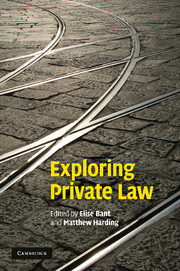Book contents
- Frontmatter
- Contents
- List of Contributors
- Foreword
- Acknowledgments
- Table of Cases
- Table of Legislation
- Introduction
- I Method
- II Unjust enrichment
- 7 The impact of legal culture on the law of unjustified enrichment: the role of reasons
- 8 Natural obligations and unjust enrichment
- 9 Causality and abstraction in the common law
- 10 Trust and theft
- III Equity and trusts
- IV Remedies
- Index
- References
9 - Causality and abstraction in the common law
Published online by Cambridge University Press: 10 November 2010
- Frontmatter
- Contents
- List of Contributors
- Foreword
- Acknowledgments
- Table of Cases
- Table of Legislation
- Introduction
- I Method
- II Unjust enrichment
- 7 The impact of legal culture on the law of unjustified enrichment: the role of reasons
- 8 Natural obligations and unjust enrichment
- 9 Causality and abstraction in the common law
- 10 Trust and theft
- III Equity and trusts
- IV Remedies
- Index
- References
Summary
Introduction
A contribution on ‘causality and abstraction’, being concerned with the relationship between contract and conveyance, may at first sight seem misplaced in a book section headed ‘Unjust Enrichment’. What, after all, do the prerequisites of a valid conveyance have to do with restitutionary claims governing the reversal of unjust enrichments? ‘Property law’ would appear to be the appropriate header. Yet it would be wrong to assume that it is possible to confine the issue to that specific box. Michael Bryan, whose retirement this collection marks, has never been one for thinking of the law in terms of isolated ‘compartments’. As his list of publications impressively illustrates, his academic interest spans all core areas of private law and is particularly caught by the ‘intersection’ between different sets of rules. An especially fascinating interface, and one which has occupied Michael on many occasions, is that between contract, property and unjust enrichment.
This chapter seeks to explore some of the pertinent questions from a distinctly Civilian perspective. It enquires into the extent to which the Common Law (in the wide sense of the word) makes the effectiveness of property transfers depend on the existence of a valid legal basis for the transfer. In doing so, it hopes to show that, whether a given Common Law system has to be classified as a ‘causal’ or an ‘abstract’ transfer system will be determined not so much – or at any rate not only – by its rules about the passing of property at common law (in the narrow sense), but also by equitable rules and principles and ultimately by its stance towards so-called ‘proprietary restitution’.
- Type
- Chapter
- Information
- Exploring Private Law , pp. 200 - 222Publisher: Cambridge University PressPrint publication year: 2010
References
- 1
- Cited by

